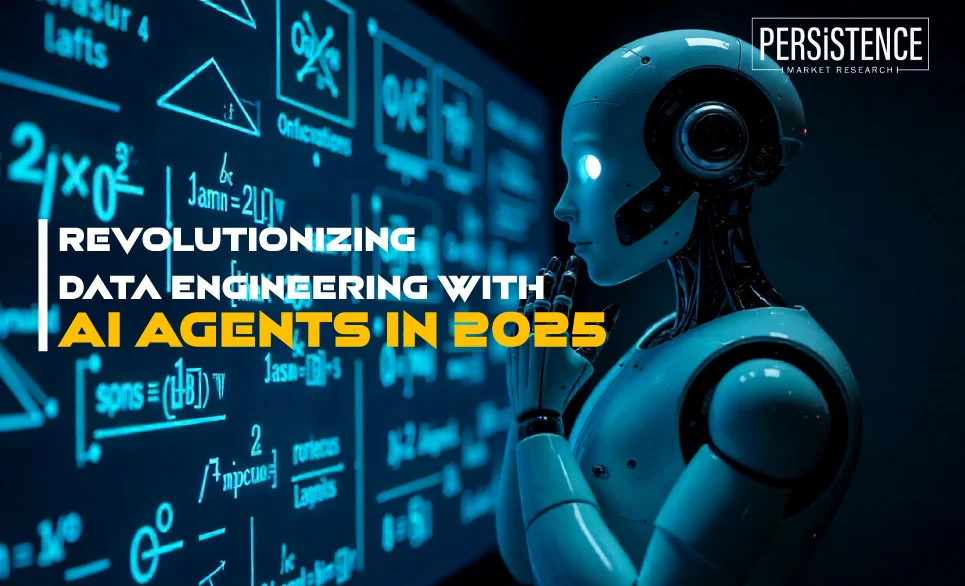- Blog
- Data Engineering Innovation
Revolutionizing Data Engineering with AI Agents in 2025
Published On : 28 Jul 2025
In the rapidly evolving of data-driven decision-making, artificial intelligence (AI) agents are emerging as powerful game changers. With growing demands for real-time analytics, scalable infrastructure, and high-quality data pipelines, traditional methods often fall short. That’s where AI agents in data engineering are stepping in.
These intelligent agents are reshaping how organizations build and manage data workflows by automating tasks, improving data governance, and enhancing integration across systems.

What Are AI Agents in Data Engineering?
AI agents are intelligent, autonomous systems that perform data-related tasks with minimal human intervention. By combining artificial intelligence, machine learning, and automation, they transform conventional data engineering into a smarter, more adaptive process.
Key characteristics of AI agents include-
- Real-time adaptability to data changes
- Ability to learn and self-optimize over time
- Seamless integration across structured, semi-structured, and unstructured data sources
- Decision-making based on contextual and historical data
These features make AI agents ideal for solving complex data engineering challenges in a modern analytics ecosystem.
Key Uses: How AI Agents Are Transforming Data Engineering
1. Automated Data Pipeline Orchestration
AI agents can autonomously build, schedule, and monitor data pipelines, identifying and resolving failures in real-time. This significantly reduces engineering overhead and ensures high data availability.
2. Data Quality Management and Anomaly Detection
Through continuous profiling, AI agents detect and resolve data quality issues like missing values, duplicates, schema drift, and anomalies—leading to better, more reliable datasets for analytics.
3. AI-Driven Data Integration
AI agents use natural language processing (NLP) and schema inference to map and integrate data across platforms. They reduce manual effort in building connectors and ensure consistent formatting.
4. Intelligent Resource Allocation
AI agents optimize cloud resource utilization by dynamically adjusting compute power and storage based on traffic, ensuring performance and cost efficiency.
How do AI agents enhance automation in data engineering beyond traditional tools?
Traditional automation relies on static logic or scheduled workflows. These systems are fragile, failing when schema changes or new data types arise.
AI agents offer dynamic automation. They are context-aware and adaptive, leveraging AI models to-
- Predict pipeline failures
- Adjust data transformations
- Reconfigure workflows in real-time
For example, if a data source adds a new column, an AI agent can validate, map, and update the ETL process without manual reconfiguration. This ensures business continuity with minimal human oversight.
Can AI agents improve data reliability and trust across large data ecosystems?
One of the biggest advantages of AI agents in data engineering is their ability to scale trust and quality across massive datasets.
These agents continuously validate data freshness and consistency and identify root causes of anomalies. They provide automated remediation or alerts and maintain data lineage and audit trails for compliance.
As data complexity increases, AI agents ensure that teams can rely on clean, compliant, and high-quality data at every step of the pipeline.
What skills do data engineers need to work effectively with AI-powered agents?
While AI agents handle repetitive tasks, human engineers must evolve into strategic orchestrators. Key skills to collaborate with AI in data engineering includes
- Machine learning fundamentals to understand AI decision-making
- Prompt engineering and NLP tooling as many agents respond to natural language
- Workflow orchestration tools for designing and overseeing agent-driven pipelines
- Data governance and compliance knowledge to guide agents within organizational boundaries
Data engineers who embrace AI agents can shift their focus from maintenance to innovation.
The Future of AI in Data Engineering
With more organizations implementing more sophisticated analytics platforms, AI in data engineering is becoming a competitive advantage. Some of the major trends that will be experienced in 2025 are-
- AI-driven self-healing data pipelines
- Real-time decisioning from AI-optimized data flows
- Quicker integration of new data sources through intelligent agents
Low-code and no-code agent interfaces will make cross-team collaboration possible
These shifts not only increase operational efficiency but also allow organizations to deliver business value faster and with greater confidence.
Final Thoughts: Why AI Agents Are the Future of Data Engineering
The rise of AI agents in data engineering signals a major transformation in how data is processed, managed, and used. By eliminating manual bottlenecks and enabling intelligent automation, these agents empower teams to focus on strategy, not just pipelines.
Organizations that invest in AI-driven data operations today are setting themselves up for a more scalable, resilient, and intelligent future.
Industry Report

Request Report Sample
Your privacy is important to us; your data is secure
Contact Us
Latest Reports
-
Baby Powder Market by Ingredient Type (Talc-based, Talc-free), Packaging Type (Plastic Bottles, Sustainable/Eco-tins, Sachet/Pouches, Others), Distribution Channel (Offline, Online), and Regional Analysis 2026 – 2033
-
Duck boots market by Product Type (Insulated Duck Boots, Waterproof Duck Boots, Fashion Duck Boots, Thermal Lined Duck Boots), Material (Rubber, Leather, Textile, Combination Materials), End-user (Men, Women, Kids), and Regional Analysis for 2026 – 2033
-
Extruded Polylactic Acid (PLA) Fiber Market by Fiber Type (Monofilament PLA Fiber, Multifilament PLA Fiber, Staple PLA Fiber, Tow PLA Fiber, Specialty PLA Fiber), Grade (Standard Grade, High-Performance Grade, Bio-modified/Enhanced Grade), End-user, and Regional Analysis, 2026 - 2033
-
Tea-Based Skin Care Products Market by Tea Type (Green Tea, Black Tea, Others), Product Form Type (Creams & Lotions, Serums, Cleansers & Masks), Application (Facial Care, Body Care, Others), and Regional Analysis 2026 - 2033
-
North America eVTOL Aircraft Lift Technology (Vectored Thrust, Multirotor, Lift Plus Cruise), Mode of Operation (Piloted, Autonomous, and Semi-Autonomous), Range (0-200 Km, and 200-500 Km), Maximum Take-off Weight (MTOW) (<250 Kg, 250-500 Kg, 500-1500 Kg, and >1500 Kg), Application (Commercial, Military, and Emergency Medical Service), Propulsion Type (Battery-Electric, Hybrid-Electric, and Hydrogen-Electric) Analysis for 2026 - 2033
